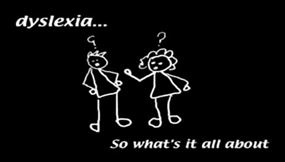Learning to read, write and to spell almost comes naturally and easy to everyone, but not for dyslexic individuals. Dyslexia is the most common cause of reading, writing and spelling difficulties. It can be seen as a language based learning difference, but not fully understood by everyone.
Many people think that Dyslexia is a rare problem, but in reality it’s not. In fact, Dyslexia is estimated to affect about 10% of the Australian Population and this percentage includes children
Dyslexia is characterized by difficulty in learning to read fluently and with inaccurate comprehension despite normal intelligence. This includes difficulty with phonological awareness, phonological decoding, processing speed, orthographic coding, auditory short-term memory, language skills/verbal comprehension, and/or rapid naming. Source: http://en.wikipedia.org/wiki/Dyslexia
Many parents find it heart-breaking and really hard to watch their kids struggle with dyslexia. It is true that no parents were ever prepared for this situation, but there are ways to help your child overcome Dyslexia.
Though it sometimes create a confusion when your child appears to learn in a different way than other children, a parent’s immeasurable love and support for their children is always the first step. Every child with dyslexia may have unpleasant experiences in school. There will always be ups and downs, but what is important is that child can count on unconditional love and support from his family, especially parents.
Early Identification and Intervention is important
There is a common misconception that Dyslexia cannot be diagnosed until 3rd grade. In reality, Dyslexia can be diagnosed as early as age 5.
It is possible to identify if your child is suffering from this condition. However, there is no single technique to identify if your child has dyslexia. Parents need to be aware of the warning signs that may tell them that their child is dyslexic. Perhaps your child always stutters or is confused with the difference of letters that may look similar in shape. Symptoms may vary, but the earlier a child is diagnosed, the quicker you can help your child overcome such condition and boost his/her self-esteem.
Dyslexia CANNOT be outgrown
Dyslexia is a long life issue, and can never be outgrown. However, early intervention can help an individual overcome this condition. Open communication with your child is always important. If your child is diagnosed to have this condition, as a parent you must talk to your child and let him understand his condition. There are in numerous steps to build his/her self esteem. And it is also very important to encourage a positive behavior while working and speaking with your child.
Does Dyslexia Affect a Child’s Intelligence?
There is another myth that smart people cannot be dyslexic. This is not true. In fact, many people diagnosed with dyslexia have average to superior intelligence. Dyslexic children will learn but they just need to be taught differently. It is very important to identify and understand your child’s difficulty, so you’ll also know the best way to help him/her.
How Can I help my child overcome this condition?
- The first action that should be taken is to have your child evaluated by a professional. Once diagnosed, a treatment plan will be created.
- Know your child’s skills and motivate your child to develop them. Give your total support and let your child spend more time doing and exploring activities, interests, skills he/she likes. Find a way on how your child can take a step ahead to stand out in the field of his or her interest.
- You should also take time to talk your child’s school about his/her condition. An ongoing encouragement and support from parents as well as teachers can make learning experience better for your child.
- Give your complete attention and patience. Take time to sit down with them, while they are doing their homework or studying their lessons. Guide them and show your support until they can fully understand the lesson.
- Try to find a suitable approach for your child’s learning. Try using word games, puzzles, audio visual clips, music etc.
- Let them feel your unconditional love and support. Like any normal children, all they need is lots of love and emotional and moral support from their family more specifically by parents.
Helping your child overcome dyslexia demands continuous support, hard work and perseverance from you as his/her parents. The very first steps may be painful, challenging or difficult for both child and parents, but excellent results are guaranteed. If you have taken this small step towards your child’s improvement, then it is NOT impossible for your child to be successful in school as well as in life.



